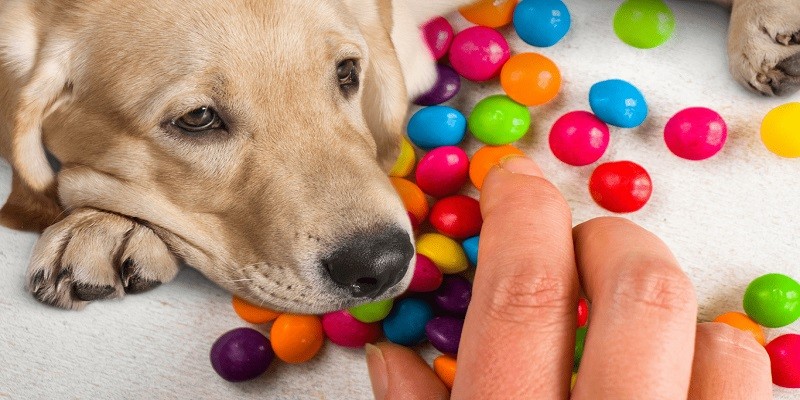No, dogs should not eat M&Ms. Ingesting them can be harmful and pose serious health risks for dogs.
Dogs are often curious creatures, with a tendency to explore and sniff out anything that catches their attention. As responsible pet owners, it’s essential to know what foods are safe for our furry friends and what can be harmful to their health.
One common question that arises is whether dogs can eat M&Ms, those colorful chocolate candies that are so popular among humans. Unfortunately, the answer is a resounding no. While M&Ms may be delicious for us, they are potentially dangerous for our canine companions. We will explore why dogs should not consume M&Ms and the potential risks and side effects associated with it. It’s crucial to be aware of the hazards to keep our dogs safe and healthy.

Credit: barkmind.com
The Dangers Of Chocolate For Dogs
M&Ms may be tempting, but they pose serious dangers to dogs. Chocolate is toxic for canines due to its theobromine content. Keep these sweet treats away from your furry friend to ensure their safety.
Chocolate toxicity in dogs:
- Dogs should never be given chocolate as it is toxic to them.
- Theobromine, a compound found in chocolate, is harmful to dogs’ health.
- The level of theobromine varies in different types of chocolate, with darker chocolates and cocoa powder containing higher amounts.
- Even small amounts of chocolate can cause significant harm to dogs, depending on their size, weight, and the type of chocolate consumed.
Why chocolate is harmful to dogs:
- Chocolate contains theobromine, a stimulant that affects a dog’s central nervous system and cardiovascular system.
- Theobromine can cause increased heart rate and blood pressure, leading to potential heart problems in dogs.
- Excessive theobromine consumption can also result in muscle tremors, seizures, and even death in severe cases.
- Dogs metabolize theobromine more slowly than humans, making them more susceptible to its toxic effects.
- Theobromine poisoning symptoms in dogs can include vomiting, diarrhea, excessive thirst, restlessness, panting, and hyperactivity.
It is crucial to keep chocolates out of your dog’s reach and avoid giving them any as a treat. If you suspect your dog has ingested chocolate or shows signs of theobromine poisoning, it is essential to seek immediate veterinary attention.
Remember, prevention is key when it comes to protecting your furry friend from the potential dangers of chocolate.
The Effects Of M&Ms On Dogs
M&Ms can be harmful to dogs due to their high sugar and chocolate content, which can lead to various health issues. It’s best to keep these colorful candies out of reach from your furry friends to ensure their well-being.
Have you ever found yourself wondering whether it’s safe to share your favorite candy, M&Ms, with your furry friend? While dogs may seem eager to taste everything we eat, it’s important to be aware of the potential risks certain foods may pose to their health.
We will delve into the effects of M&Ms on dogs to help you make an informed decision.
Ingredients In M&Ms That Are Harmful To Dogs:
M&Ms, with their vibrant colors and tempting crunch, contain ingredients that can be harmful to dogs. Here are some key components found in M&Ms that can pose risks:
- Chocolate: Chocolate contains theobromine, a chemical that is toxic to dogs. Depending on the type and amount of chocolate ingested, dogs may experience various symptoms, ranging from mild discomfort to more severe health issues.
- Xylitol: This sugar substitute is commonly found in sugar-free versions of M&Ms. While it is safe for humans, xylitol can be extremely dangerous for dogs. Even small amounts can lead to a rapid release of insulin in dogs, causing a dangerous drop in blood sugar levels.
- Artificial colors and additives: M&Ms contain artificial colors, such as Blue 1, Yellow 5, and Red 40, which have the potential to trigger allergic reactions or gastrointestinal issues in dogs.
Symptoms Of M&M Ingestion In Dogs:
If your furry companion manages to sneak a few M&Ms, it’s crucial to be aware of the possible symptoms they may experience. Here are some common signs of M&M ingestion in dogs:
- Vomiting: Dogs that have ingested M&Ms may start vomiting as their body tries to eliminate the foreign substance.
- Diarrhea: Intestinal upset, characterized by loose stools, is another common symptom that may occur after M&M ingestion.
- Increased heart rate: Consumption of chocolate can cause an increase in a dog’s heart rate, potentially leading to palpitations and restlessness.
- Tremors and seizures: In some cases, dogs may experience tremors or even seizures due to the toxic effects of chocolate.
- Lethargy and weakness: The chemicals present in M&Ms can cause dogs to become lethargic and weak, making them less active than usual.
Remember, if you suspect your dog has ingested M&Ms or any other potentially harmful substance, it is important to seek immediate veterinary care. Their expertise will ensure proper diagnosis and appropriate treatment.
Now that we have explored the effects of M&Ms on dogs, you can make an informed decision when it comes to sharing your sweet indulgence with your furry companion. As a responsible pet owner, it’s crucial to prioritize your dog’s health and well-being by avoiding foods that could harm them.
What To Do If Your Dog Eats M&Ms
Wondering if it’s safe for your dog to eat M&Ms? It’s best to avoid it as chocolate can be toxic to dogs. If your dog accidentally consumes M&Ms, contact your vet immediately for advice and assistance. Keep your furry friend safe and away from any potential dangers.
Can My Dog Eat M&Ms?
Many of us love to enjoy M&Ms as a sweet treat, but what about our furry friends? Are M&Ms safe for dogs to consume? Let’s explore the potential risks and what to do if your dog happens to eat some M&Ms.
Read on to find out more.
Emergency Actions To Take:
In case your dog accidentally consumes M&Ms, here are some immediate actions you can take to address the situation:
- Stay calm and assess the situation: Observe your dog’s behavior and try to determine the quantity of M&Ms ingested.
- Keep the packaging: Note down the ingredients and the approximate amount of M&Ms your dog ate. This information will be helpful for your veterinarian.
- Contact a veterinary professional: Reach out to your veterinarian or an emergency vet clinic for guidance on how to proceed. Provide them with all the relevant details.
When To Seek Veterinary Assistance:
While not all cases of M&M ingestion by dogs require immediate veterinary attention, it’s crucial to be aware of when it’s necessary. Here are scenarios in which you should consult a veterinarian:
- Large quantity consumed: If your dog has eaten a significant amount of M&Ms, especially those containing chocolate, it’s important to seek advice from a veterinary professional.
- Presence of symptoms: If your dog displays symptoms such as vomiting, diarrhea, excessive thirst, restlessness, increased heart rate, or any unusual behaviors after consuming M&Ms, contact your vet immediately.
- Potential toxic ingredients: If the M&Ms contained any toxic substances apart from chocolate, like artificial sweeteners (xylitol), it is vital to consult your veterinarian.
Remember, it’s always better to err on the side of caution when it comes to your dog’s well-being. Consulting with a veterinary professional ensures the best course of action for your furry friend’s health.
Although it can be tempting to share our favorite treats with our pets, it’s crucial to remember that some human foods can be harmful to dogs. Ensuring that your dog’s diet consists of appropriate and safe foods will help keep them healthy and happy.
Always prioritize your dog’s health and seek professional guidance if you have any concerns or questions regarding your dog’s diet or potential food consumption.
Frequently Asked Questions Of Can My Dog Eat M&Ms?
Can Dogs Eat M&Ms?
Dogs should not eat M&Ms because chocolate contains theobromine, which is toxic to dogs.
Why Are M&Ms Bad For Dogs?
M&Ms contain chocolate, specifically cocoa solids, which can be harmful to a dog’s digestive system.
What Happens If A Dog Eats M&Ms?
If a dog eats M&Ms, they may experience symptoms such as vomiting, diarrhea, increased heart rate, and even seizures.
Can A Small Amount Of M&Ms Harm A Dog?
Yes, even a small amount of M&Ms can be harmful to a dog, as chocolate toxicity depends on the dog’s size and the type of chocolate consumed.
Is There A Safe Alternative For Dogs?
Yes, instead of M&Ms, there are dog-friendly treats available that are specifically made for canine consumption and do not contain chocolate.
Conclusion
M&Ms may be a tempting treat for many of us, but when it comes to our furry friends, caution should be exercised. Dogs should not be given M&Ms as they contain ingredients that can be harmful to their health. The presence of chocolate, especially in higher concentrations, can lead to symptoms such as vomiting, increased heart rate, and even seizures in dogs.
Besides, the sugar content in M&Ms can contribute to weight gain and dental issues in our canine companions. As responsible pet owners, it is crucial to prioritize the well-being of our dogs and provide them with a balanced and suitable diet.
Instead of sharing M&Ms, opt for dog-friendly treats that are specifically formulated for their nutritional needs. Ultimately, keeping our dogs safe and healthy should always be our top priority.
Last Updated on May 10, 2025 by Pauline G. Carter

